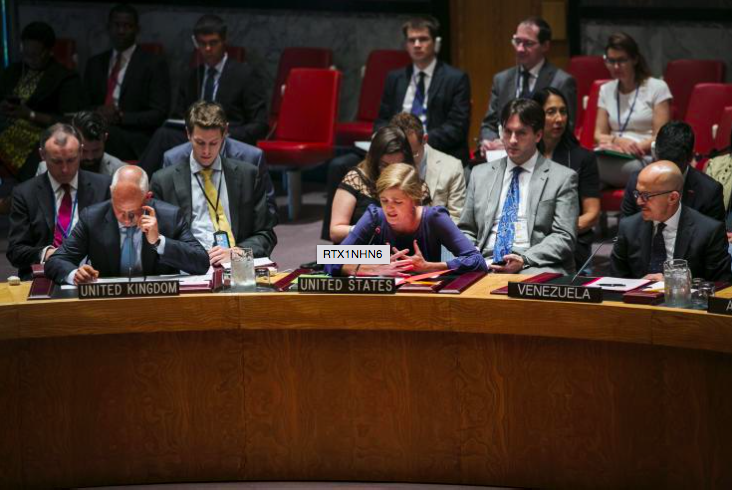Why is ISIL the herald of LGBT rights?
After nearly seventy years of ignoring and circumventing the issue, the United Nations’ Security Council discussed LGBT (the UN did not use “Q”) rights for the first time.
The United States and Chile called to order the historic meeting hoping to further the global recognition of LGBT rights. The rights in question do not relate to marriage equality, which is typically debated in more progressive Western countries, but rather fundamental freedoms that have been severely infringed on the basis of gender and sexuality. These freedoms include an LGBT person’s right to raise their voice against an oppressor and freely be who they are without the worry of impending persecution.
The August 24 meeting underscores the influence that social rights movements, not-for-profits, and LGBT-friendly governments have had globally. As Samantha Power, the United States Ambassador to the UN, noted, “this represents a small but historic step.”
Although this “small but historic step” should not be overlooked, indignation that it took so long for the international community to trudge forward is pivotal. Additionally,
ISIL (the Islamic State of Iraq and the Levant) has committed countless human rights violations. It has beheaded individuals for their nationalities, their different religions, and sometimes without specified reasons. It has massacred and pillaged towns, desecrated religious monuments, and actively promoted violence regionally and abroad. However, the fact that the Security Council’s LGBT rights conversation has only been initiated in the context of ISIL’s extremism continues to be disturbing.
In the meeting, Subhi Nahas, a gay Syrian refugee, spoke in-person about ISIL’s targeting of LGBT youth and fleeing his native country out of fear. Adnan,” a gay Iraqi refugee, relayed his narrative over the phone under a pseudonym, which was created to protect his identity. “Adnan” highlighted that in his former home, “being gay means death,”
Alongside these testimonials, the International Gay and Lesbian Human rights Commission presented a slideshow (may be graphic for some viewers) describing the murders of LGBT citizens carried out by ISIL in the weeks preceding the meeting. ISIL’s persecution relied heavily on stonings, beheadings, shootings, and even throwing someone off a building into cheering crowds.
This meeting should have happened years ago, yet nothing triggered it before. The deaths of LGBT individuals during the Second World War; the “corrective” rape of lesbians in South Africa; and Russia’s anti-gay propaganda law have not startled the Security Council enough to take direct actions. LGBT rights have been discussed prior in the United Nations, but never in the most important and only organ capable of producing binding legislation. It took two gay refugees from Syria and Iraq to testify before (a limited number of) countries’ representatives about “living under authoritarian governments, militant groups and the Islamic State (ISIL),” as Newsweek’s Lucy Westcott described, to elicit a reaction,
The Security Council’s internal dynamics are likely to blame. With five permanent members who can veto resolutions and ten rotating members, each on the Council for two year shifts, the Security Council is plagued by certain countries’ refusal to recognize LGBT citizens. Russia and China, both permanent members, have successfully sidestepped past discussions. In the last meeting, neither delegation spoke. Malaysia and Nigeria also declined to comment, while Chad and Angola did not attend. In total, six of the fifteen members did not cooperate. Although their silence consequently empowered voices that otherwise would not be heard, the discrimination LGBT individuals have faced only became concerning because of ISIL’s involvement.
The message here is that LGBT rights are only important if they are convenient. Here, they facilitate combatting an extremist organization.
There has never been a consensus to condemn the over seventy countries that have criminalized homosexuality. The eight countries where an LGBT person can be sentenced to death because of their sexuality have rarely been questioned, except for occasionally by the Obama administration and other Western heads of state. The expectation continues to be tolerating prejudice under the guise of cultural differences as to not offend anyone. But, as Subhi Nahas remarked, “LGBT is not just a terminology invented by the West.”
What is most alarming is that the United Nations was established to prevent further genocides. Even with the deaths of LGBT individuals during the Second World War and the conspicuous discrimination they have faced historically and cross-culturally, the Security Council has not spotted even the smallest similarities. It took ISIL to wake some countries up. The loss of LGBT lives has been a consequential afterthought.
Sources: Newsweek, Al Jazeera, the US State Department, United Nations Human Rights,

A senior in his third and final year as part of the Talon, Michael serves as co-Editor-in-Chief alongside Faria Nasruddin. Prior to being Editor-in-Chief,...









